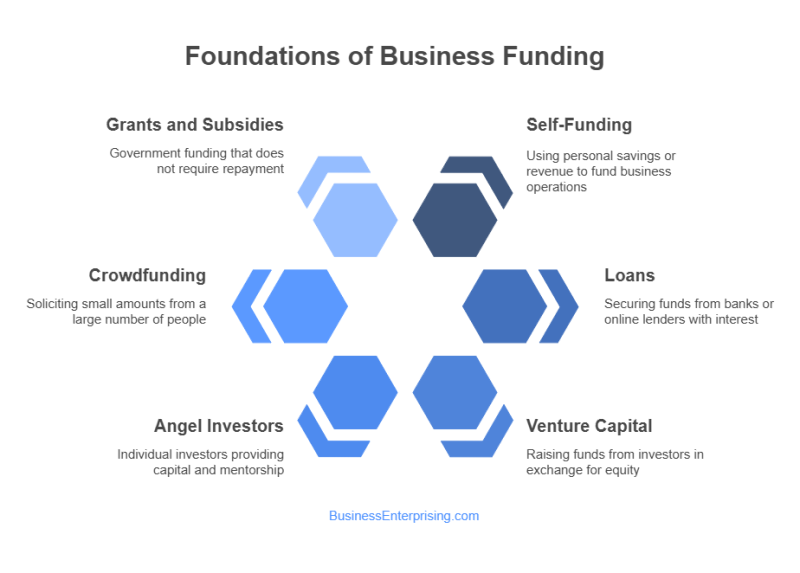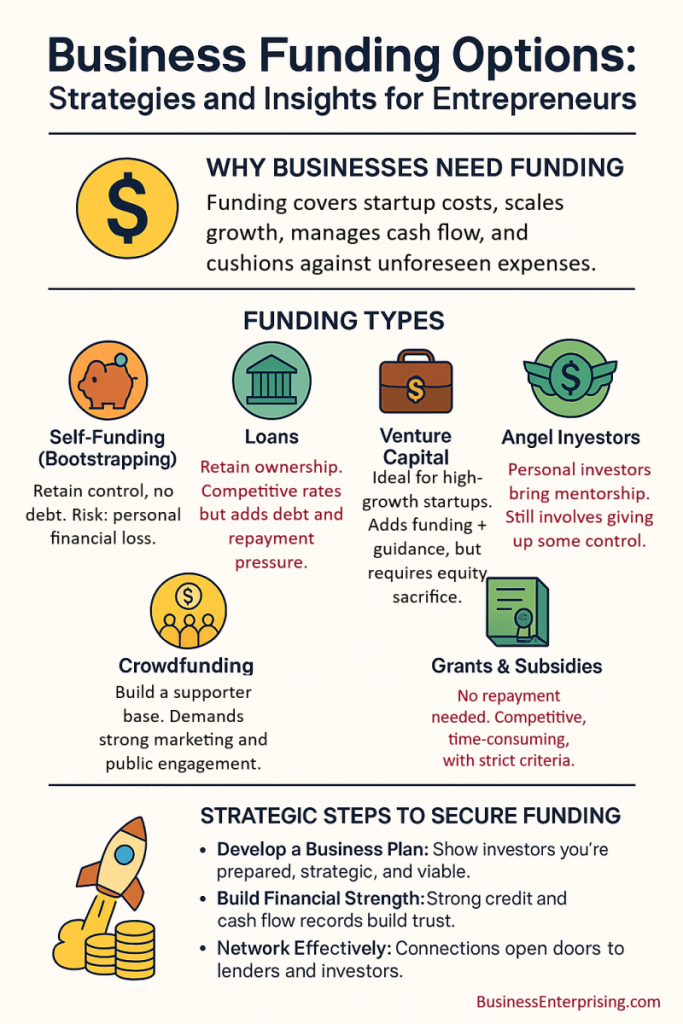 Securing adequate funding is a pivotal step for any business, whether it’s a startup or an established company. Knowing what business funding options are available to you is essential for covering operational costs, financing growth initiatives, and ensuring long-term sustainability. Let’s take a look at the various options available to businesses, the benefits and drawbacks of each, and strategic approaches to securing the necessary capital.
Securing adequate funding is a pivotal step for any business, whether it’s a startup or an established company. Knowing what business funding options are available to you is essential for covering operational costs, financing growth initiatives, and ensuring long-term sustainability. Let’s take a look at the various options available to businesses, the benefits and drawbacks of each, and strategic approaches to securing the necessary capital.
Understanding the Need for Business Funding
Firstly, it’s crucial to understand why businesses need funding. At the inception stage, startups require capital to cover initial expenses such as product development, market research, and hiring key personnel. Without sufficient funding, even the most innovative ideas may never come to fruition. As businesses grow, funding becomes necessary to scale operations, enter new markets, and invest in technology and infrastructure.
Moreover, businesses need funding to manage cash flow effectively. Operational costs such as payroll, rent, and utilities are ongoing expenses that must be met to keep the business running smoothly. In addition, unforeseen expenses or economic downturns can strain a company’s finances, making access to funding a critical safety net.
Types of Business Funding
There are several business funding options to consider, each with its own set of advantages and challenges. Understanding these options can help entrepreneurs make informed decisions about the best way to finance their business.
Self-Funding
Also known as bootstrapping, self-funding involves using personal savings or revenue generated from the business to fund operations. This method allows entrepreneurs to retain full control of their business without taking on debt or giving up equity. However, self-funding can be risky, as it involves investing personal finances that may be lost if the business fails.
Loans
Business loans are a common funding option. They can be obtained from banks, credit unions, or online lenders. Traditional bank loans often require collateral and a strong credit history, but they offer competitive interest rates. On the other hand, online lenders may provide faster access to funds with less stringent requirements, though at higher interest rates. Loans provide the advantage of retaining business ownership, but the obligation to repay with interest can strain cash flow.
Venture Capital
Venture capital (VC) involves raising funds from investors in exchange for equity in the business. This type of funding is ideal for high-growth startups with significant market potential. VCs not only provide capital but also bring valuable expertise and connections to help the business grow. However, securing venture capital can be highly competitive, and entrepreneurs must be willing to give up a portion of their ownership and control.
Angel Investors
Similar to venture capitalists, angel investors are individuals who invest their own money into startups in exchange for equity. Angel investors often come with valuable industry experience and can provide mentorship and guidance. While angel investment is less formal and more flexible than VC, it still involves giving up some ownership and control.
Crowdfunding
Crowdfunding has emerged as a popular way to raise funds by soliciting small amounts of money from a large number of people, typically via online platforms like Kickstarter or Indiegogo. This method not only provides access to capital but also helps validate the business idea and build a community of supporters. However, successful crowdfunding campaigns require significant effort in marketing and promotion.
Grants and Subsidies
Government grants and subsidies are another source of funding, particularly for businesses in certain sectors such as technology, healthcare, and green energy. Grants do not need to be repaid, making them an attractive option. However, the application process can be competitive and time-consuming, with strict eligibility criteria.
Strategic Approaches to Securing Funding
Securing business funding requires a strategic approach. Here are some key steps to consider:
Develop a Solid Business Plan
Firstly, having a comprehensive business plan is essential. A well-crafted plan outlines the business’s goals, target market, competitive landscape, revenue model, and financial projections. It demonstrates to potential investors or lenders that the business is well-prepared and has a clear path to profitability.
Build a Strong Financial Profile
Secondly, maintaining a strong financial profile is crucial. This includes having a good credit score, keeping detailed financial records, and managing cash flow effectively. Lenders and investors will scrutinize the business’s financial health, so it’s important to present a robust financial picture.
Network and Build Relationships
Building relationships with potential investors, lenders, and industry experts can significantly enhance the chances of securing funding. Networking events, industry conferences, and online platforms like LinkedIn can provide opportunities to connect with key stakeholders. Establishing trust and demonstrating the business’s potential can lead to valuable funding opportunities.
Consider Multiple Funding Sources
Diversifying funding sources can reduce risk and increase the chances of securing the necessary capital. Entrepreneurs should explore various options and not rely solely on one source of funding. For example, combining a small business loan with an angel investment can provide both the capital and the expertise needed to grow the business.
Prepare for Due Diligence
Investors and lenders will conduct due diligence to assess the viability of the business. Entrepreneurs should be prepared to provide detailed information about their business model, market strategy, financial performance, and management team. Transparency and thorough preparation can instill confidence and facilitate the funding process.
Conclusion
In summary, having access to several business funding options is a critical component of entrepreneurial success. Understanding the different types of funding, along with their respective advantages and challenges, allows entrepreneurs to make informed decisions. By developing a solid business plan, maintaining a strong financial profile, networking effectively, and preparing for due diligence, businesses can strategically position themselves to secure the funding they need to thrive. As the business landscape continues to evolve, access to capital will remain a key factor in driving innovation, growth, and long-term sustainability.


